11+ Sample Construction License Agreement
-
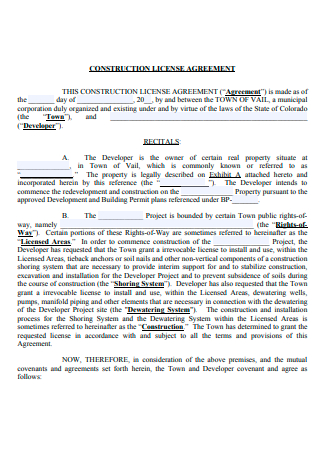
Construction License Agreement Template
download now -
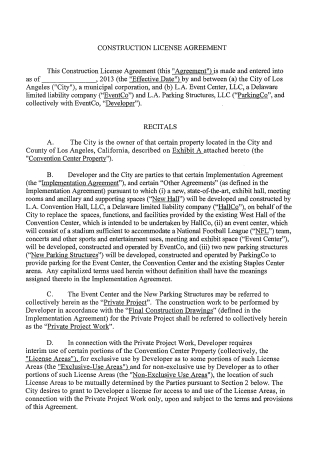
Construction License Agreement Example
download now -
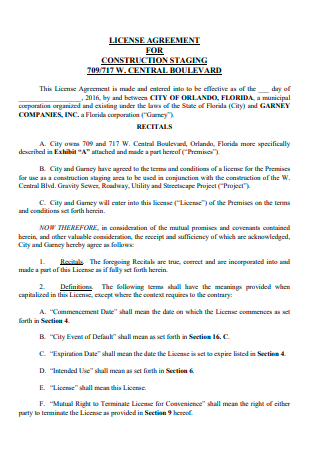
Construction Staging License Agreement
download now -
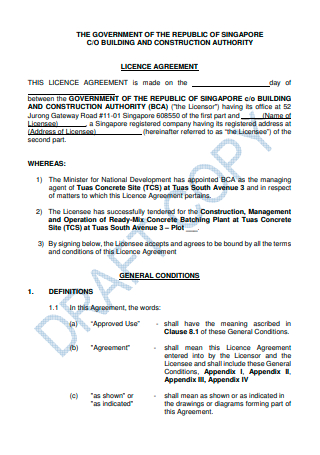
Building and Construction Authority License Agreement
download now -
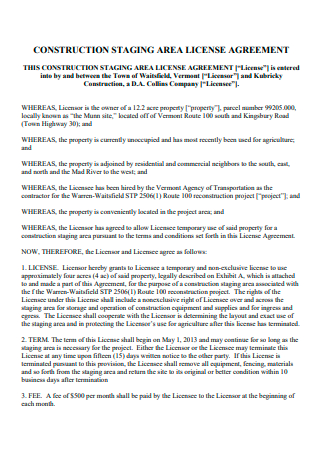
Construction Staging Area License Agreement
download now -
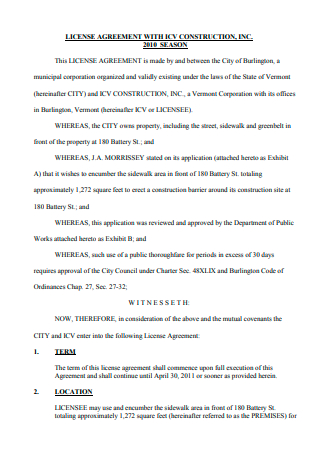
Construction License Agreement in PDF
download now -

Basic Construction License Agreement
download now -
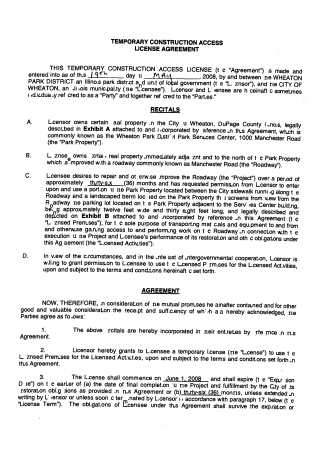
Temporary Construction Access License Agreement
download now -
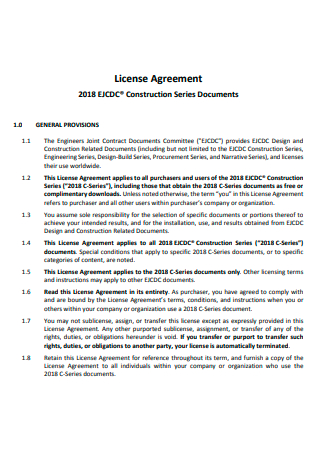
Construction Series License Agreement
download now -
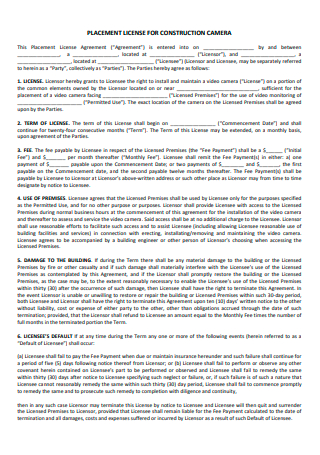
Construction Camera Placement License Agreement
download now -
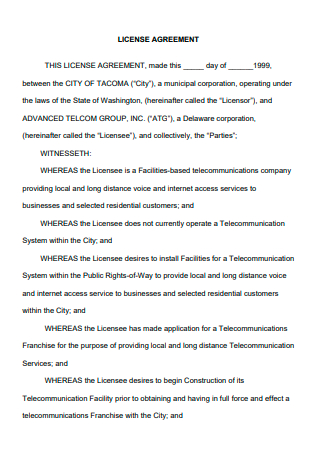
Standard Construction License Agreement
download now -
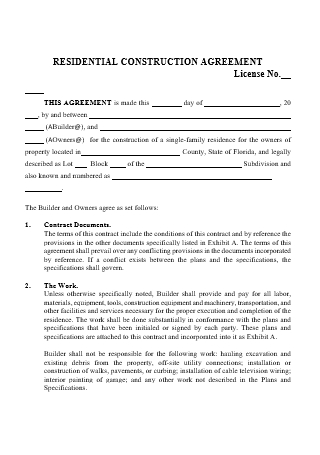
Residential Construction License Agreement
download now
FREE Construction License Agreement s to Download
11+ Sample Construction License Agreement
What Is a Licensing Agreement?
Benefits of Contractor’s License
Tips for Choosing a Construction Company
How to Start Your Construction Business
FAQs
What does a contractor do?
Is it worth becoming a contractor?
Why do contractors make more money?
What Is a Licensing Agreement?
A licensing agreement is a legal, written contract between two parties in which the property owner grants another party permission to utilize their brand, patent, or trademark. The agreement specifies the type of licensing agreement, the terms of use, and how the licensor is compensated. Contract types differ depending on the authorized item. Additionally, licensing agreements prevent conflicts regarding sales, quality concerns, and royalties. In 2014, building construction, refurbishment, maintenance, demolition, and civil engineering projects collectively accounted for more than 273 million jobs globally, accounting for an estimated 8.6% of the global workforce.
Benefits of Contractor’s License
Becoming a licensed contractor is an excellent strategy for expanding your firm and gaining access to larger building jobs. To become a licensed general contractor, you must pass an exam and fulfill other requirements depending on your state. Due to the burdensome nature of exams and costs, some contractors need a license to operate. This may be acceptable for some modest handyperson projects, but for anything more significant, there may be repercussions. Working without a permit might expose you to potentially harmful and illegal situations, jeopardizing your safety and ability to work. Read on to discover five reasons for obtaining a general contractor’s license advantageous.
Tips for Choosing a Construction Company
Find a construction business with unique skill sets, experience, and resources in construction if you intend to have a structure erected. With experts, your project will be completed under budget and on schedule. However, construction is time-consuming and requires specialized knowledge and skills. Today, there are innumerable options for construction companies, but picking one that fits your needs sounds intimidating. Below are six guidelines for selecting a reputable construction company for your project.
1. Find a Construction Firm with a Safe and Healthy Workplace
A corporation that prioritizes health and safety responsibilities is always dependable. Ensure that the construction companies you hire provide a safe and healthy work environment. Note the safety requirements they adhere to. Do they comply with the quality and safety standards established for construction firms? In addition, the company should be tight and punctual about time. Explore their project portfolio and determine how long it takes them to accomplish various projects. Note that the project duration varies depending on the project’s size and complexity. Determine if the maximum amount of their task can be completed within the allotted budget.
2. Choose a Reputable and Established Construction Company
A verified business is insured and licensed, indicating that its services are entirely reputable. Spend sufficient time investigating the company’s reputation. Start by conducting an Internet search and then read evaluations of their services published on reputable websites. Then, examine the ratio of unsatisfied to satisfied customers. More negative evaluations indicate that most customers were dissatisfied with the company’s services. If necessary, contact the company’s previous clientele. It is an easy method for locating a leading construction firm capable of handling your job efficiently. The last customers provide candid opinions regarding their experiences. In addition, they describe whether the organization understood the design and construction requirements, the issues that arose throughout the project, and how the specialists dealt with them. Furthermore, a trustworthy business always provides references from previous customers.
3. Check the Tools and Equipment
The construction company’s tools and equipment quality reveals much about its operational standards and capabilities. Ensure that the organization you pick employs a variety of modern tools and technologies. The best construction companies can finish the most complicated projects on time using cutting-edge, creative technology. Find firms with experience delivering diverse projects, such as marine and substantial infrastructure projects.
4. Compare the Costs and Duration
Always select a construction business that submits a competitive proposal. Only employ companies that provide adequate budget overviews. Look for prices and completion deadlines that are reasonable. A budget that is too low or a deadline that is too soon indicates inexperience on the part of the construction company. These construction firms need to meet the client’s expectations. Get everything in writing in a legally binding contract. Also, select a company with extensive understanding and ideas for various construction designs. Surprisingly, even the best construction companies are only sometimes accustomed to complex architectural concepts. Employing a company that needs to gain knowledge of multiple architectural designs results in severe problems, such as faulty materials. Ultimately, it raises construction costs. In addition, be specific about your expectations, so the professional knows what to expect.
5. Consider the Experience of a Project Group
The competence and understanding of the specialists (such as the preconstruction manager, project executive, and superintendent) working on your project are just as important as the company’s experience. They are responsible for the majority of your construction project. Determine who is in charge of your project. Next, obtain access to the resumes of key project leaders and managers. It aids you in learning about their schooling, professional designations, prior experiences, and projects they have managed. In addition, you obtain a good impression of their professional competence.
6. Choose a Contractor That Guarantees Excellent Customer Service
Choose a construction company with a reputation for producing great work. The company is competent enough to handle all types of project complexity. The contractor places customer happiness and service above anything else. Choosing an expert who can discover and comprehend their clients’ style preferences is best. They are trustworthy when it comes to managing your expectations. If you cannot select the correct contractor, you will experience a great deal of tension, leading to many inescapable issues. Consequently, searching for a reputable construction firm that provides a satisfying and stress-free experience is essential.
How to Start Your Construction Business
Construction is one of the most popular industries for new businesses, but it also has one of the worst failure rates. In the first five years, 63.6% of construction enterprises fail due to a lack of business knowledge and experience, insufficient funds, or inadequate planning. You are not required to be one of them. You can ensure that your business has a solid foundation for growth by conducting market research, developing a detailed business plan, and obtaining assistance. Additionally, it can assist you in avoiding the difficulties that many new construction firms encounter. Where do you begin?
1. Investigate Your Local Market
Your first question should be whether or not a construction company is even an option in your area. After all, if there are already too many construction companies in the area and customers are happy with them, it might be hard to break into the market, let alone start a successful business. So first do some research on the market. You should find out how many construction companies are already in your area, what they specialize in, how much they charge, and what their reputation is like. This information can help you make a better business plan and give you a leg up on the competition when you finally get out.
2. Prepare a Business Plan
Once you have a solid grasp of the local market, you can begin developing a business strategy. This is one of the most crucial documents you will create when launching your firm, as it will help you stay on course and boost your chances of success. You’ll also provide this strategy to lenders to obtain finance, so it’s crucial to be comprehensive and utilize your market research. However, you should include your construction accounting procedures in your business strategy as a contractor. For instance, how would you handle billing? Some customers may want a fixed lump sum pricing, while others prefer a time-and-materials breakdown. Consider whether you will operate as a cash-based or accrual-based business and if you will recognize revenue based on completed contracts or a percentage of contract completion. Consult a construction CPA to help determine what works best for you. They can discuss some of these crucial business factors with you.
3. Register Your Business
Registering your firm as a legal entity can provide personal liability protection and legal and tax benefits once you have completed your business plan. Writing a business is as simple as recording the company’s name with state and municipal officials. However, as not all states may issue them automatically, you should also register your business with the federal government to obtain a federal tax identification number or employer identification number (EIN).
4. Locate the Appropriate Licenses & Permits
After registering your firm, you must acquire the necessary licenses and permissions. Depending on your state, your business’s location, size, and the type of work you intend to perform, you will likely require a license or permission to operate legally on both the federal and state levels. Certain business activities, including transportation, drilling, and mining, are governed by federal permit requirements. For instance, special licenses are required for oversized and overweight trucks. Therefore, you may need permission to move building materials, prefabricated walls, or equipment.
5. Secure Insurance & Liabilities
In addition to licenses and permissions, you must consider insurance for yourself and your employees. Given the dangerous nature of many construction tasks, it is essential to have coverage in case of injury. The owner of a construction business needs to have a thorough understanding of all the potential responsibilities involved in the event of an accident. Even if you need more time to devote yourself to a comprehensive contingency plan at the outset, you should have a realistic concept of what it would mean for your business if something were to occur. Most states and construction contracts will require you to carry workers’ compensation insurance at a minimum. However, you may also require general liability insurance, professional liability insurance, automobile insurance, and builder’s risk insurance. Therefore, the sooner you begin planning, the better off you will be.
FAQs
What does a contractor do?
Typically, a contractor plans and supervises the construction of commercial or residential buildings. Here are some of their most important duties: Consultation with clients to assess their project requirements. Communicating with clients to address their inquiries or problems.
Is it worth becoming a contractor?
For some, contracting is the best decision they’ll ever make because it allows them to take charge of their careers. However, leaving a permanent position comes with hazards, so don’t be fooled into believing that contracting is always the better option.
Why do contractors make more money?
Even if a permanent worker and a contractor receive the same compensation, the contractor will likely earn more. This is because contractors have options regarding how their payment is structured and their business structure.
Creating an Agreement that addresses the legality of running a Construction firm is a potential source of significant stress. Regardless of how difficult it is, with proper legal research and direction, this could benefit you and those who depend on it. In light of this, it is highly recommended that you utilize the templates offered above to increase your efficiency in creating this project.
